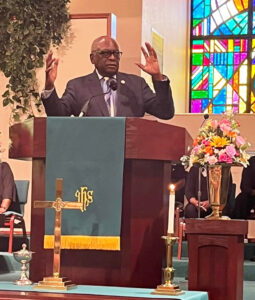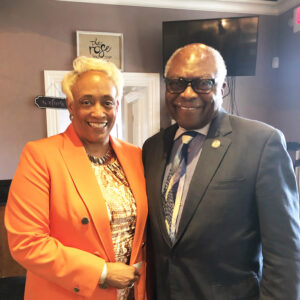
By Fletcher Word
The Truth Editor
Congressman James Clyburn visited the Glass City on Sunday, September 11, and joined local Congresswoman Marcy Kaptur – who is the midst of a re-election campaign – for a whirlwind tour of Toledo central city communities.
Clyburn, the Democratic representative of South Carolina’s 6th District (covering much of the southern part of that state), has served in Congress since 1993 and is the House Majority Whip – the third ranking position in his party
Clyburn has had remarkable success on the political scene in the last few years. He was elected Majority Whip by his colleagues in 2019; he was undoubtedly the person most responsible for getting Joe Biden elected president (he endorsed Biden in 2020 as the South Carolina primary approached and Biden had fallen short of expectations in previous contests) and his influence continued in his long-term push to get the first Black woman (Ketanji Brown Jackson) appointed to the Supreme Court.
After visits to churches on Sunday – Warren AME and Jerusalem MBC – the congressional duo enjoyed a luncheon at the Laborers Local 500 Training Center and, afterwards, a session at the Onyx Café with about a dozen small Black business owners.
“If you’ve got a problem, just tell us,” said Clyburn to the business owners at the Onyx. “That’s why we exist.”

The owners were not at all reticent in sharing their concerns with the South Carolina representative. Those concerns included absentee landowners, food deserts and an inability to tap into funds that federal and state governments make available to majority business owners.
Clyburn, as he noted frequently during the day, is not at all reluctant to accept advice and counsel. He is eager, he said, to receive input and encouraged his audiences to pitch in with it.
Clyburn, speaking at the Onyx, used as an example the passage of the CARES Act in 2020 during the Trump administration. The $2.3 trillion COVID relief package was to be funneled to businesses through banks. Clyburn received a call from a banker wondering why the bill had been structured in that way because, as a banker, he was obligated to take care of bank customers first and foremost – he warned Clyburn that many in underserved communities would not have access to such funds.
Clyburn noted that when the follow up relief package was passed in 2021 during the Biden administration (the Coronavirus Response and Consolidated Appropriations Act), it was designed to go directly into the hands of American workers, families and small businesses.
“Experience is the best teacher,” he said.
However, it’s not just banks that federal legislators should be wary of, said Clyburn. Some states are also a problem – a point with which Kaptur concurred.
“Our problem is the state of Ohio,” said Kaptur. “This is a state whose governance is not visionary.” She noted that money coming into the state from the federal government gets spent in Columbus as the state administration sees fit not necessarily as the federal government intended.
Clyburn has learned from his experience to construct such bills – the American Recovery and Reinvestment Act in 2009, for example – “so that local communities are not at the mercy of the states.”
Clyburn has also learned that sometimes getting things done in the legislature, especially for underserved communities, is more easily accomplished if it happens under the radar. He used as an example President Biden’s recent very public announcement of the student loan forgiveness program and the outcry that announcement caused.
The contrast was previous student loan forgiveness programs for certain segments of society that have happened quietly and have gone relatively unnoticed.
The lesson was in knowing when and how loudly to bang the drum.
Clyburn, after spending the day touring Toledo’s central city, flew home to South Carolina that evening to check in on his own re-election campaign – a pretty sure thing in his safe district.




